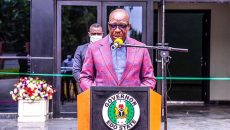President Goodluck Jonathan flags off multi-million dollars private sector-financed power project in Edo State.
A private sector-driven Independent Power Project, IPP, which will generate 450 megawatts of electricity has kicked off in Edo State. The groundbreaking ceremony for the $1 billion project being undertaken by Azura Power West Africa Limited in partnership with the Edo State government was performed recently by President Goodluck Jonathan at Ihiovbore/Idunmwowina/Orior-Osemwende communities near Benin City.
Turning the sod to signal the commencement of the project, President Jonathan noted that “indeed, this 450 megawatts, mw, of new generation capacity has attracted almost a billion dollars mainly in foreign direct investment into the power sector,” explaining that this “comprised of $700 million in construction of the power plant and $300 million in associated gas supply infrastructure.” The multi-million dollar first phase of the Azura Edo Power project is being financed by the World Bank, Africa Development Bank, the United States Development Bank, China’s Development Bank and a consortium of local banks.
The President who hailed the project as “a major milestone in our power reforms programme” said, “We are happy to associate with Azura as this model of private sector investment in new generation capacity represents the next logical step in our vision for uninterrupted access to power for our people.” He described the project as a first in many ways. “It is the first fully financed private sector power plant to get to this final stage under the new framework facilitated by our reform instituted agencies. It is the first power generation project to receive the World Bank Partial Risk Guarantee and Multilateral Investment Guarantee Agency, MIGA, support. It is also the first signal from the global financial industry that the years of work that the federal government has dedicated to the reform of the power sector, in order to attract private sector developers and financing, is finally yielding results.”
The President said he was “greatly encouraged today at the progress made so far towards reforming the power sector since I launched the Road Map on Power Reform back [on] August 26, 2010,” adding that “we sought to fulfil the intent of the Electric Power Sector Reform Act 2005, which strives to liberalise the sector and bring in private sector ownership, management and financing to the industry.”
President Jonathan, whose administration’s far-reaching reforms in the power sector have started to impact positively on electricity supply in the country, noted that “the fastest way to increase power supply, in the near term, was by completing the National Integrated Power Projects that had been suspended for a number of years. Subsequently, we have addressed every one of these issues by reconstituting and empowering an Independent Nigerian Electricity Regulatory Commission, establishing the Nigerian Bulk Electricity Trading, NBET, as “The Bulk Trader” and a credit-worthy off-taker by capitalising it to the tune of $800 million, and concluding the privatisation of the Power Holding Company of Nigeria, PHCN, successor companies through a globally adjudged transparent process, and settling all the labour liabilities.”
While expressing his government’s commitment “to irreversibly repositioning the Nigerian power sector as a pivot for the attainment of the nation’s developmental targets,” Jonathan said majority of the NIPP projects had been completed. “Near here, in close proximity to the Azura power project, is the 508mw Ihovbor NIPP power generation plant, which has been generating power since last year.” Charging the project sponsors and their contractors to ensure that the estimated completion date of early 2017 was met, the President said he looked forward to when the Azura IPP begins to supply power to the national grid.
Adams Oshiomhole, host governor and facilitator of the project, said, “The decision by the Azura Group and the support that they have enjoyed from both international and local financial institutions is the most potent vote of confidence on the reforms that have been initiated in the power sector,” stressing that “it has shown that you believe that these reforms are meant to stay.” The governor also observed that “it also shows that bringing an investment of $800 million regardless of what is happening in other parts, that this country is still the safest in the continent for both foreign and local investors.”
According to Oshiomhole, “The power sector is a sector to which the people have virtually given up. The politics of privatising the power sector is as old as 1999 and we are beginning to see that the private sector is now having renewed confidence in the reforms you have helped to revive.” The governor said the state was the ideal place for the project to be located because “in this part of the South-south, communities welcome with their two hands all those who wish to come and locate investments here.”
Chinedu Nebo, minister of power and steel, in his welcome address, said the project had the support of the federal government. Nebo said the 450mw power project was the first phase of a projected 1,500mw capacity, with construction expected to be completed in 2017. David Ladipo, managing director, Azura Power, said the project was being developed by a consortium of local and international investors led by Amaya Capital Ltd, and American Capital Energy and Infrastructure. The project is expected to generate about 1,000 direct jobs and over 20,000 indirect jobs for the people of Edo State from the construction stage to full operations.
Follow Us on Social Media




 WhatsApp us
WhatsApp us